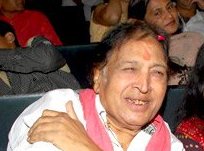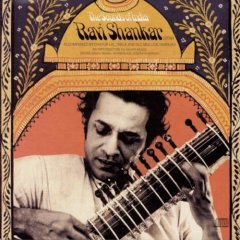Related Research Articles

Ravi Shankar was an Indian sitarist and composer. A sitar virtuoso, he became the world's best-known expert of North Indian classical music in the second half of the 20th century, and influenced many musicians in India and throughout the world. Shankar was awarded India's highest civilian honour, the Bharat Ratna, in 1999. He is also the father of American singer Norah Jones.

Asha Bhosle is an Indian playback singer, entrepreneur, actress and television personality who predominantly works in Indian cinema. Known for her versatility, she has been described in the media as one of the greatest and most influential singers in Hindi cinema. In her career spanning over eight decades she has recorded songs for films and albums in various Indian languages and received several accolades including two National Film Awards, four BFJA Awards, eighteen Maharashtra State Film Awards, nine Filmfare Awards including a Lifetime Achievement Award and a record seven Filmfare Awards for Best Female Playback Singer, in addition to two Grammy nominations. In 2000, she was honoured with the Dadasaheb Phalke Award, India's highest award in the field of cinema. In 2008, she was honoured by the Government of India with the Padma Vibhushan, the second-highest civilian honour of the country. The Guinness Book of World Records acknowledged her in 2011 as the most recorded artist in music history.

The Kronos Quartet is an American string quartet based in San Francisco. It has been in existence with a rotating membership of musicians for 50 years. The quartet covers a very broad range of musical genres, including contemporary classical music. More than 1,000 works have been written for it.

Rahul Dev Burman was an Indian music director and actor, who is considered to be one of the greatest and most successful music directors of the Hindi film music industry. From the 1960s to the 1990s, Burman composed musical scores for 331 films, bringing a new level of music ensemble with his compositions. Burman did his major work with legendary singers Mohammed Rafi, Kishore Kumar, Lata Mangeshkar, and Asha Bhosle. He also worked extensively with lyricist Gulzar, with whom he has some of the most memorable numbers in his career. Nicknamed Pancham, he was the only son of the composer Sachin Dev Burman and his Bengali lyricist wife Meera Dev Burman.

Ustad Allauddin Khan, was an Indian sarod player and multi-instrumentalist, composer and one of the most notable music teachers of the 20th century in Indian classical music. For a generation many of his students, across different instruments like sitar and violin, dominated Hindustani classical and became one of the most famous exponents of the form ever, including his son Ali Akbar Khan.

Ustad Sultan Khan was an Indian sarangi player and classical vocalist belonging to Sikar Gharana. He was one of the founding members of the Indian fusion group Tabla Beat Science, with Zakir Hussain and Bill Laswell. He was awarded the Padma Bhushan, India's third highest civilian honour, in 2010.

Aashish Khan Debsharma is an Indian classical musician, a player of the sarod. He was nominated for a Grammy Award in 2006 for the 'Best Traditional World Music Album' category for his album "Golden Strings of the Sarode". He is also a recipient of the Sangeet Natak Akademi Award. Besides being a performer, composer, and conductor, he is also an adjunct professor of Indian classical music at the California Institute of the Arts, and the University of California at Santa Cruz, in the United States.
Krishna Mohan Bhatt is a sitar player, teacher and scholar from Jaipur, India.

The Sounds of India is an album by Ravi Shankar which introduces and explains Hindustani classical music to Western audiences. Released by Columbia Records in 1957, it was influenced by Ali Akbar Khan's The Sounds of India, and recorded and produced by George Avakian in 1957 at Columbia's New York studio.

"Piya Tu Ab To Aja" is a song from the 1971 Hindi film Caravan. It is considered the quintessential cabaret item number by the actress Helen. The song was sung by Asha Bhosle and R.D. Burman. It was composed by R. D. Burman with lyrics by Majrooh Sultanpuri. Music scholar Nilanjana Bhattacharjya identified "Piya Tu Ab To Aja" as one of the culturally important Hindi film songs. The song has also been called "the catalyst" that made "Asha [Bhosle] the queen of cabaret numbers".

In Concert 1972 is a double live album by sitar virtuoso Ravi Shankar and sarodiya Ali Akbar Khan, released in 1973 on Apple Records. It was recorded at the Philharmonic Hall, New York City, in October 1972, and is a noted example of the two Hindustani classical musicians' celebrated jugalbandi (duet) style of playing. With accompaniment from tabla player Alla Rakha, the performance reflects the two artists' sorrow at the recent death of their revered guru, and Khan's father, Allauddin Khan. The latter was responsible for many innovations in Indian music during the twentieth century, including the call-and-response dialogue that musicians such as Shankar, Khan and Rakha popularised among Western audiences in the 1960s.

Fantasias for Guitar and Banjo is the debut album of the folk guitarist Sandy Bull, released in 1963 through Vanguard Records.

"I Am Missing You" is a song by Indian musician Ravi Shankar, sung by his sister-in-law Lakshmi Shankar and released as the lead single from his 1974 album Shankar Family & Friends. The song is a rare Shankar composition in the Western pop genre, with English lyrics, and was written as a love song to the Hindu god Krishna. The recording was produced and arranged by George Harrison, in a style similar to Phil Spector's signature sound, and it was the first single issued on Harrison's Dark Horse record label. Other contributing musicians include Tom Scott, Nicky Hopkins, Billy Preston, Ringo Starr and Jim Keltner. A second version appears on Shankar Family & Friends, titled "I Am Missing You (Reprise)", featuring an arrangement closer to a folk ballad.

Joi Bangla is an EP by Indian sitar virtuoso Ravi Shankar, issued in August 1971 on Apple Records. The recording was produced by George Harrison and its release marked the first in a series of occasional collaborations between the two musicians that lasted until the Chants of India album in 1997. Shankar recorded the EP in Los Angeles, to help raise international awareness of the plight faced by refugees of the Bangladesh Liberation War, in advance of his and Harrison's Concert for Bangladesh shows at Madison Square Garden, New York. Side one of the disc consists of two vocal compositions sung in Bengali, of which the title track was a message of unity to the newly independent nation, formerly known as East Pakistan. The third selection is a duet by Shankar and sarodya Ali Akbar Khan, supported by Alla Rakha on tabla, a performance that presaged their opening set at the Concert for Bangladesh.
Kamalesh Maitra, often referred to by the title Pandit, was an Indian classical musician, composer and teacher. He is recognised as the last master of the tabla tarang – a melodic percussion instrument consisting of numerous individually tuned hand drums, set in a semicircle. Maitra grew up in Calcutta and played the tabla until joining Uday Shankar's ballet company in 1950 and taking up the tabla tarang. He became the company's musical director and toured internationally with the troupe through to the mid 1970s.

Music of India: Morning and Evening Ragas is the debut album by Indian sarod master Ali Akbar Khan, released in 1955. Issued on Angel Records, it is considered a landmark recording, being the first album of Indian classical music ever released.
The Asian Music Circle was an organisation founded in London, England, in 1946, that promoted Indian and other Asian styles of music, dance and culture in the West. The AMC is credited with having facilitated the assimilation of the Indian subcontinent's artistic traditions into mainstream British culture. Founded by Indian writer and former political activist Ayana Angadi and his English wife, Patricia Fell-Clarke, a painter and later a novelist, the organisation was run from their family home in the north London suburb of Finchley.

Ravi Shankar: In Celebration is a compilation box set by Indian classical musician and composer Ravi Shankar, released in 1996 on Angel Records in conjunction with Dark Horse Records. The four discs cover Shankar's international career, from the 1950s to the mid 1990s, and include recordings originally released on the World Pacific, HMV, Angel, Apple, Dark Horse and Private Music record labels. Shankar's friend George Harrison compiled and co-produced the set, which was issued as part of year-long celebrations for Shankar's 75th birthday.

Collaborations is a four-disc compilation box set by the Indian classical musician Ravi Shankar and the former Beatle George Harrison. Released in October 2010 on Dark Horse Records, it compiles two studio albums originally issued on that label – the long-unavailable Shankar Family & Friends (1974) and Ravi Shankar's Music Festival from India (1976) – and Chants of India, first issued on Angel Records in 1997. Although all three albums were originally Shankar releases, for which Harrison served in the role of music producer and guest musician, both Shankar and Harrison are credited as artists on the box set. Each of the collaborative projects represents a departure from Shankar's more typical work as a sitarist and performer of Hindustani classical ragas, with the box set showcasing his forays into, variously, jazz and rock, Indian folk and orchestral ensembles, and devotional music.

Ravi Shankar's Festival from India is a double album by Indian musician and composer Ravi Shankar, released on World Pacific Records in December 1968. It contains studio recordings made by a large ensemble of performers, many of whom Shankar had brought to the United States from India. Among the musicians were Shivkumar Sharma, Jitendra Abhisheki, Palghat Raghu, Lakshmi Shankar, Aashish Khan and Alla Rakha. The project presented Indian classical music in an orchestral setting, so recalling Shankar's work as musical director of All India Radio in the years before he achieved international fame as a soloist during the 1960s.
References
- 1 2 3 4 5 6 7 8 "Ken Hunt", Rock's Backpages (retrieved 21 April 2017).
- 1 2 3 4 5 6 7 8 9 "Ken Hunt's biography", World Music: Ken Hunt & Petr Dorůžka (retrieved 21 April 2017).
- 1 2 3 "Ken Hunt", pulseconnects.com (retrieved 21 April 2017).
- ↑ Toni Brown (ed.) (with Lee Abraham & Ed Munson), Relix: The Book: The Grateful Dead Experience, Backbeat Books (Milwaukee, WI, 2009; ISBN 978-1-617-13414-2), p. 207.
- ↑ Rob Young, Electric Eden: Unearthing Britain's Visionary Music, Faber and Faber (London, 2010; ISBN 978-0-571-23752-4), p. 621.
- ↑ "Donald's Encyclopedia of Popular Music", donaldclarkemusicbox.com (retrieved 21 April 2017).
- ↑ Ken Hunt, "Review: Ravi Shankar Ali Akbar Khan, In Concert 1972", Gramophone , June 1997, p. 116.
- 1 2 James E. Perone, The Album: A Guide to Pop Music's Most Provocative, Influential, and Important Creations, Praeger (Santa Barbara, CA, 2012; ISBN 978-0-313-37906-2), p. 294.
- ↑ Tom Pollard, "Ken Hunt remembers the inspirational Czech jazz champion Lubomír Dorůžka (1924–2013)", Jazzwise , 15 January 2014 (retrieved 12 January 2018).